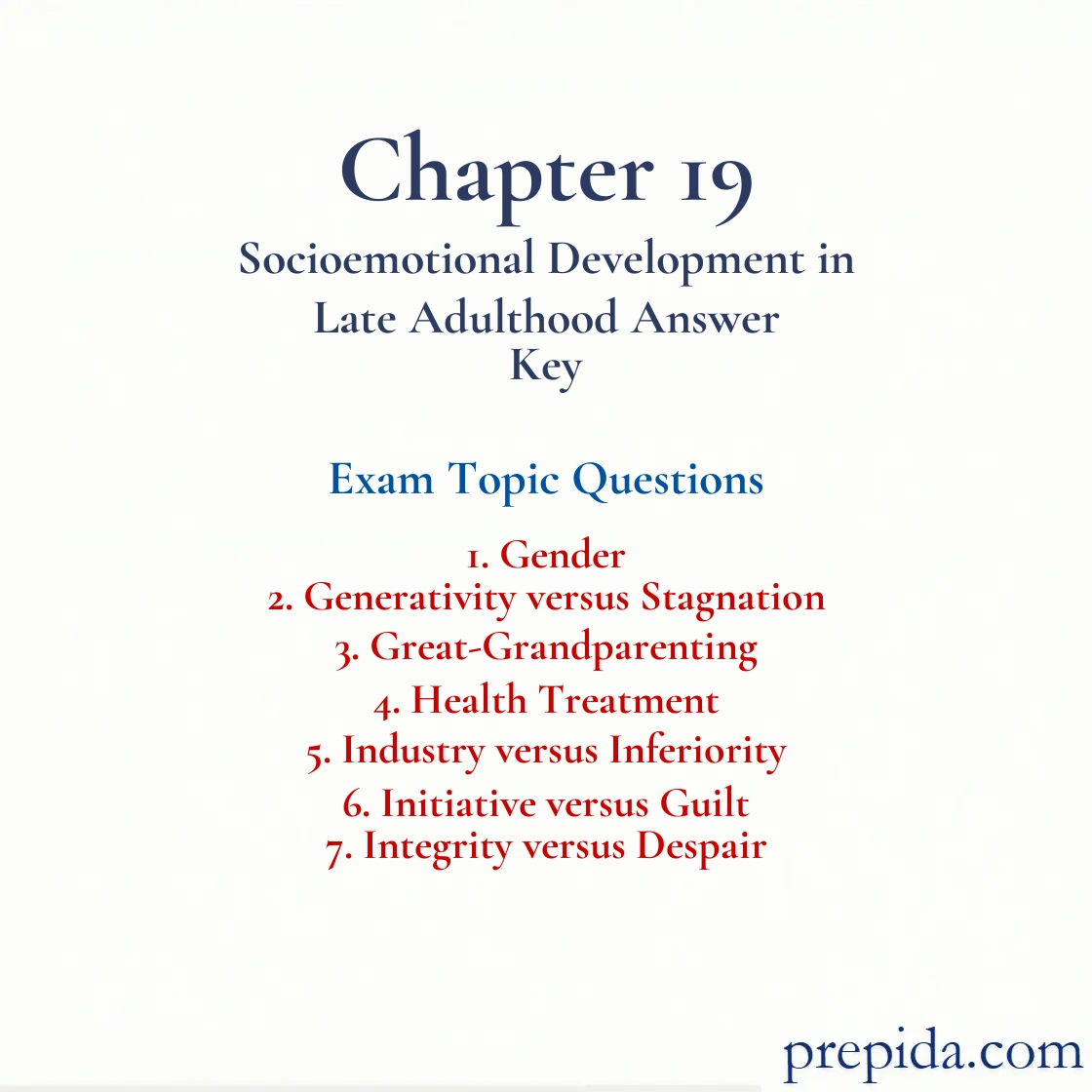
What is the "triple jeopardy" faced by African American and Latino women when it comes to income and financial levels of support in the elder years?
- ageism, sexism, and racism
- medicare, Medicaid, and welfare
- unemployment, poverty, and insufficient Medicare
- inadequate housing, job displacement, and lack of medical care
Ageism: Prejudice against others because of their age, especially prejudice against older adults.
According to Erikson, which of the following stages of development does an individual experience in middle adulthood?
- generativity vs. stagnation
- autonomy vs. shame
- industry vs. inferiority
- integrity vs. despair
Middle Adulthood: The developmental period that begins at approximately 40 to 45 years of age and extends to about 60 to 65 years of age.
According to Erikson, the positive resolution of the conflict of generativity vs. stagnation culminates in ________ in old age.
- caring for others, and empathy and concern
- existential identity
- a sense of complexity of relationships
- humor and resilience
Which of the following is a positive resolution of the psychological conflict of generativity vs. stagnation?
- infidelity
- wisdom
- care
- will
Care Perspective: The moral perspective of Carol Gilligan, which views people in terms of their connectedness with others and emphasizes interpersonal communication, relationships with others, and concern for others.
Kendall was a kind and empathetic woman who actively participated in fund-raising events for charity organizations even when she was 87 years old. During her middle adulthood, she began caring for others and empathizing with people who were socially disadvantaged. Which of the following psychosocial conflicts did Kendall most likely experience that resulted in the resolution mentioned in the scenario?
- generativity vs. stagnation
- autonomy vs. shame
- industry vs. inferiority
- initiative vs. guilt
Middle Adulthood: The developmental period that begins at approximately 40 to 45 years of age and extends to about 60 to 65 years of age.
Which of the following is a recent trend in grandparenting?
- both grandparents moving in with parents to care for their grandchildren
- an increase in the number of grandparents becoming great-grandparents
- grandparents shifting away from the role of distant figures and toward the role of fun-seekers
- grandfathers assuming the role of raising grandchildren
Generational Inequity: The view that our aging society is being unfair to its younger members because older adults pile up advantages by receiving inequitably large allocations of resources.
According to a study by Yang and Levey in 2015, the cost of ________ disease has been increasing in the United States, especially for women, who in a recent analysis bear six times the cost of medical care for the disease.
- Chagas
- Addison's
- Crohn's
- Alzheimer
Alzheimer Disease: A progressive, irreversible brain disorder characterized by a gradual deterioration of memory, reasoning, language, and eventually, physical function.
According to Erikson, the positive resolution of which developmental stage culminates in acceptance of the course of one's life and unfulfilled hopes in old age?
- generativity vs. stagnation
- basic trust vs. mistrust
- industry vs. inferiority
- intimacy vs. isolation
Acceptance: Kübler-Ross’ fifth stage of dying, in which the dying person develops a sense of peace, an acceptance of her or his fate, and, in many cases, a desire to be left alone.
Which of the following is a positive resolution of the psychological conflict of industry vs. inferiority?
- fidelity
- wisdom
- competence
- love
Which of the following is a positive resolution of the psychological conflict of initiative vs. guilt?
- fidelity
- purpose
- competence
- love
Which of the following of Erikson's developmental stages do individuals experience in early childhood?
- initiative vs. guilt
- industry vs. inferiority
- identity vs. confusion
- intimacy vs. isolation
Which of the following is Erikson's eighth stage of development?
- generativity versus stagnation
- integrity versus despair
- industry versus inferiority
- autonomy versus shame
Integrity Versus Despair: Erikson’s eighth and final stage of development, which individuals experience in late adulthood. This involves reflecting on the past and either piecing together a positive review or concluding that one’s life has not been well spent.
According to Erik Erikson's developmental stages, which of the following is the resolution an individual is most likely to experience if he or she is in the last stage of human development?
- care
- fidelity
- wisdom
- hope
Wisdom: Expert knowledge about the practical aspects of life that permits excellent judgment about important matters.
Erik Erikson believed that people who experience isolation in early adulthood and stagnation in middle adulthood are more likely to experience ________ in late adulthood.
- despair
- inferiority
- shame and doubt
- identity diffusion
Middle Adulthood: The developmental period that begins at approximately 40 to 45 years of age and extends to about 60 to 65 years of age.
According to Erik Erikson, what is the last stage of development in life?
- death versus dying
- integrity versus despair
- immortality versus death
- independence versus dependence
Integrity Versus Despair: Erikson’s eighth and final stage of development, which individuals experience in late adulthood. This involves reflecting on the past and either piecing together a positive review or concluding that one’s life has not been well spent.
According to Erikson, the ________ stage of development involves reflecting on the past and either piecing together a positive review or concluding that one's life has not been well spent.
- integrity versus despair
- autonomy versus shame
- industry versus inferiority
- generativity versus stagnation
Integrity Versus Despair: Erikson’s eighth and final stage of development, which individuals experience in late adulthood. This involves reflecting on the past and either piecing together a positive review or concluding that one’s life has not been well spent.